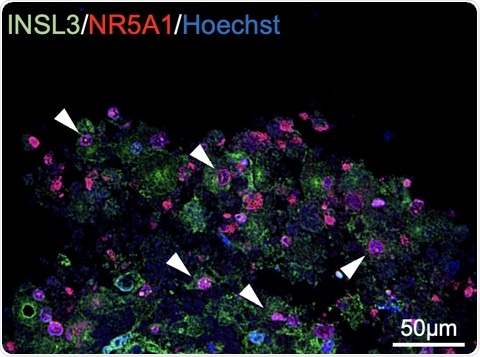Scientists from Kobe University’s Graduate School of Science, Technology and Innovation/Graduate School of Medicine recently succeeded in creating Leydig cells from human induced pluripotent stem (iPS) cells. Leydig cells produce the male hormone (testosterone), and it is anticipated that Leydig cell transplants might be a treatment for late-onset hypogonadism in the future.

Expression of Leydig cell-specific genes. White arrowheads indicate double-positive cells. Image Credit: Kobe University.
The team included Professor Takashi Aoi of the Department of iPS cell applications, and Researcher Takaki Ishida and Kobe University President Masato Fujisawa of the Division of Urology.
The study was published on September 21st, 2021 in the Endocrinology journal.
Main points
- The scientists successfully created Leydig cells from human iPS cells.
- They ascertained that functional testosterone was produced from the Leydig cells.
- It is anticipated that Leydig cell transplant from human iPS cells can offer treatment for patients suffering from late-onset hypogonadism in the future.
Research background
It is widely known that middle-aged women experience perimenopausal symptoms around 10 years before the onset of menopause. This is because of the decreasing levels of the female hormone estrogen.
Men too encounter a decrease in hormone levels (testosterone) as they age, and the identified symptoms of include decline in sexual function (for instance libido and erectile function), depression, decreased muscle mass, and reduced bone density.
These symptoms have a substantial effect on the quality of life (QOL) of the patients. It is estimated that a few hundred thousand to more than two million men in Japan have symptoms, but the awareness is low.
Recently patients with late-onset hypogonadism (LOH) are treated with male hormone replacement therapies, but there exist problems with these treatments.
These treatments demand frequent hospital visits and do not revive the physiological functions that control hormone levels in the blood. The scientists resolved to try to create testosterone-secreting Leydig cells from human iPS cells (having the capability to differentiate into all kinds of cells) in the anticipation that transplanting these induced cells into patients will offer a definitive treatment method for LOH.
Research findings
The researchers created Leydig cells by expressing NR5A1 in male-derived human iPS cells. NR5A1 performs a vital role in the development of the adrenal glands and gonads. The produced cells expressed genes particular to Leydig cells.
The iPS-generated Leydig cells secreted the male hormone (testosterone). A cell proliferation experiment was later carried out utilizing LNCaP cells, that proliferate in response to testosterone. The scientists identified that testosterone produced from the iPS-derived Leydig cells increased LNCaP cell proliferation, signifying that the hormone was functional.
Further developments
The current study succeeded in creating Leydig cells from human iPS cells. It is anticipated that this accomplishment would lead to the future implementation execution of regenerative medicine where Leydig cells created from human iPS cells are transplanted into patients with LOH.
Moreover, Leydig cells are hard to culture as they do not proliferate in vitro. Hence, Leydig cells created from human iPS cells can be helpful in various researches and not just regenerative medicine.
Source:
Journal reference:
Ishida, T., et al. (2021) Differentiation of Human Induced Pluripotent Stem Cells Into Testosterone-Producing Leydig-like Cells. Endocrinology. doi.org/10.1210/endocr/bqab202.